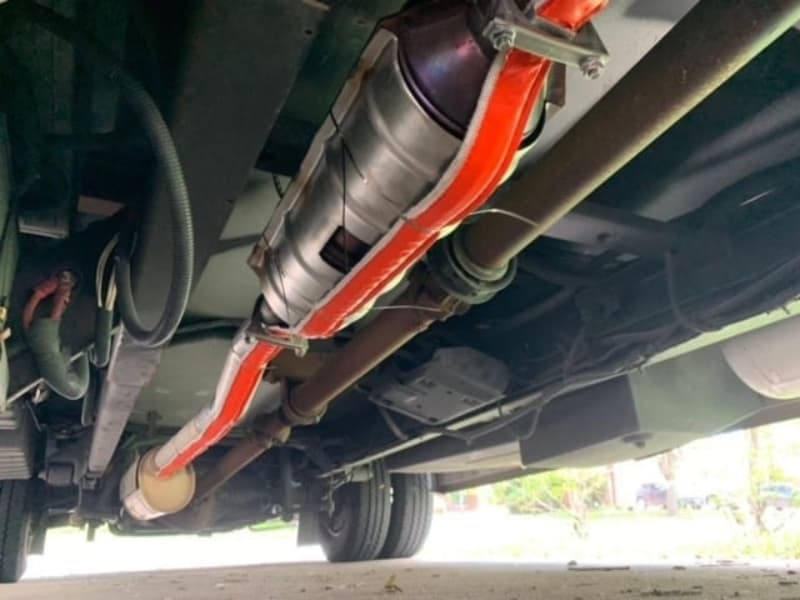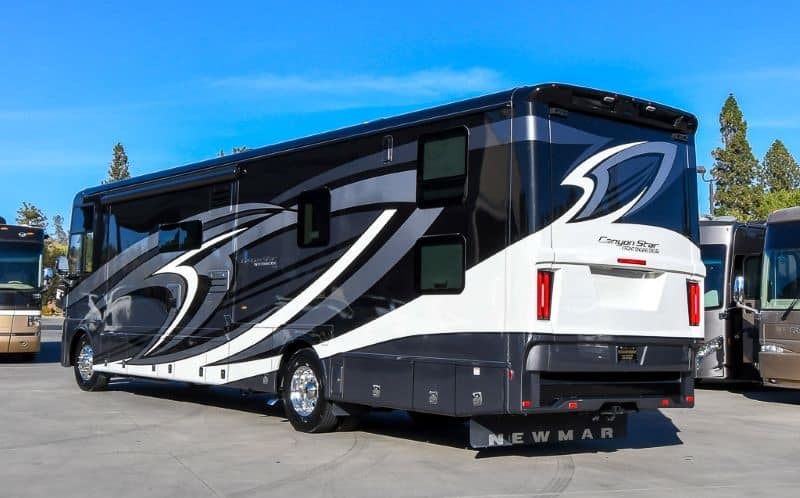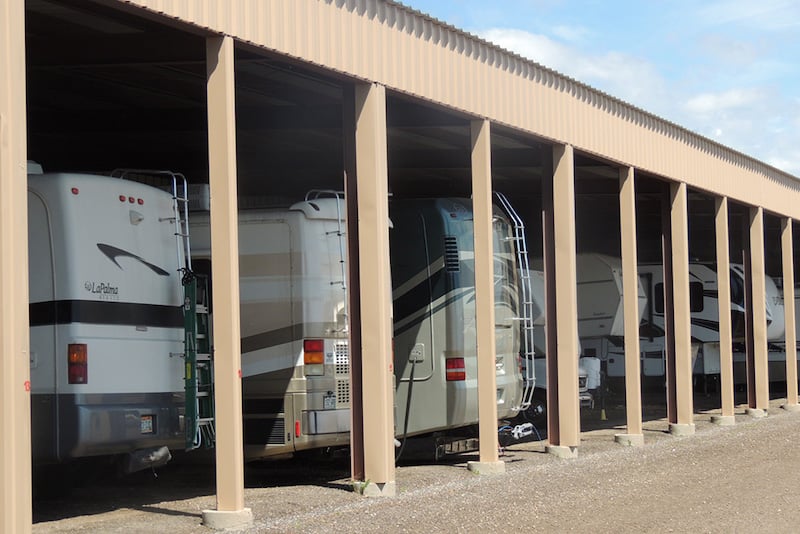RV catalytic converter theft is on the rise. All drivable RVs have a catalytic converter, and each contains a small but significant amount of precious metal. Rising commodity prices have made RV catalytic converters highly valuable on the scrap market.
What’s more, is that often these devices are easily accessible. This makes cutting them away from the exhaust system of the motorhome quick and nearly effortless. Thus, RV catalytic converter theft is increasing.
While a thief may only profit a few hundred dollars, the price to repair your motorhome can be much more. Therefore it’s important to take extra precautions to protect your RV’s catalytic converter against this increasingly common crime.
Luckily for RVers everywhere, the Cat Strap burst onto the RV scene a few years ago as a response to this common and costly crime. The Cat strap has quickly become the best anti-theft device for RV catalytic converters on the market. Vigilant RVers everywhere are installing this popular add-on in the hopes that they won’t fall victim to catalytic converter theft.
What Is A Catalytic Converter?
Catalytic converters, sometimes called cat converters, are a part of the exhaust system on any vehicle. Their purpose is to convert harmful engine-exhaust pollutants into less harmful emissions. A catalytic converter relies on chemical reactions to accomplish this task.
Within the catalytic converter is a catalyst. The catalyst looks like a ceramic honeycomb enclosed within a metal shell. Precious metals like platinum, palladium, and rhodium coat the honeycomb.
As harmful gasses move through the exhaust system, they pass over this catalyst and trigger a chemical reaction. It is this reaction that breaks down these dangerous gasses and transforms them into less harsh emissions. Once converted, these gasses exit the vehicle through its tailpipe.
Every motorized vehicle in the United States is required to have a catalytic converter. RVs are no different. Depending on their size and capabilities, some RVs even have more than one catalytic converter. On diesel motorhomes, you’ll find more complex diesel cat converters. While RV catalytic converters may vary with engine type and rig size, they are important to any motorhome.
Why Are Catalytic Converters Stolen?
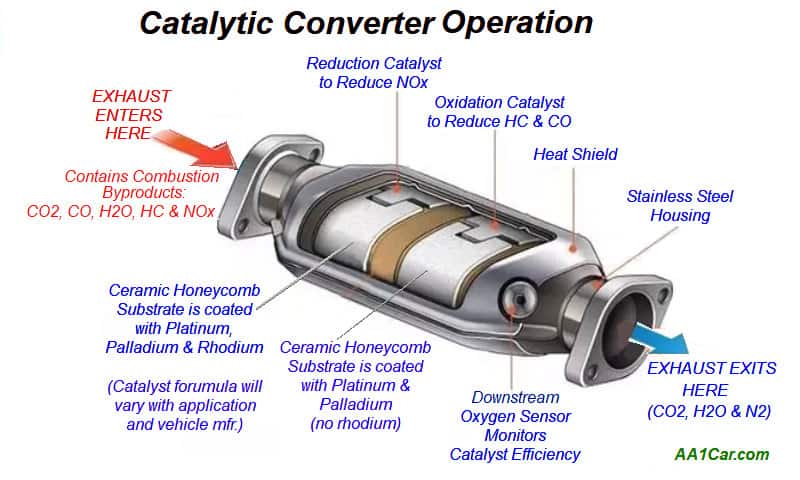
It’s illegal and incredibly harmful to the environment to drive a vehicle without a catalytic converter. Unfortunately, would-be thieves aren’t concerned about that in the least. As we already mentioned, catalytic converters contain palladium and platinum. They are, therefore, quite valuable on the scrap market due to the price of these precious metals.
RV catalytic converters are larger and contain more of these precious metals than their daily driver counterparts. Some RVs even have multiple cat converters on board, making them an even more desirable target for thieves.
Replacement RV catalytic converters are expensive and sometimes hard to come by. Therefore, stolen units are also valuable as a whole piece.
What’s more, is that RV catalytic converters are easy targets. With a small reciprocating saw, a thief can remove one in under a minute. RVs are often stored in remote locations and are, therefore, especially vulnerable to cat converter theft.
Some teams of thieves have even been known to target RV lots. In these crimes, they have removed the catalytic converters from dozens of motorhomes all at once. This is a relatively high effort-to-reward type of theft, and thus why this type of crime is on the rise.
Thankfully, there are ways to protect your RV’s catalytic converter from being stolen. Some people use bright paint to mark their cat converters. This may work to discourage would-be thieves because the markings alert scrap buyers to potentially stolen merchandise. Others purchase devices that make it harder to access and cut away the catalytic converter.
Our favorite RV catalytic converter anti-theft device is the Cat Strap. Its bright color deters thieves. Moreover, the device itself makes it much more difficult, if not impossible, to cut away the catalytic converter.
What Is The Cat Strap, And How Does It Work?
So what exactly is the Cat Strap, and how does it work? The Cat Strap is an anti-theft device that is made of steel cables encased in a high-temperature adhesive strap.
As a first layer of protection, the Cat Strap is a bright orange color. This is meant to deter potential thieves from targeting your RV in the first place. If a thief is bold enough to try and cut away your catalytic converter, even after seeing the security device in place, they are in for a surprise. The steel cables within the Cat Strap are designed to dull or even break the blades on a reciprocating saw. This makes it nearly impossible to cut the catalytic converter free from under an RV.
You may wonder why a thief would not try and remove the Cat Strap before cutting. The short answer is that they cannot. Once installed, the heat generated by your vehicle activates the adhesive backing on the Cat Strap. Once bonded to the exhaust system, the Cat Strap is nearly impossible to remove.
What about Ford-based chassis (F53, E-450, and E-350 models) that have especially easy-to-access catalytic converters? The RV Max Protect Cat Strap Kit is specifically designed to protect these RVs. This kit comes with two heavy-duty straps, each built with three layers of ultra-hardened cutting blade steel.
Overlap these double straps on the backside and then wrap them around to protect the exhaust pipe’s top and bottom. This provides double the cutting protection. Like other Cat Strap models, the RV Max Protect kit is bright orange and comes with a heat-activated adhesive strip.
You can partner both the Cat Strap and the RV Max Protect Cat Strap kit with the Cateye Alarm. This motion-activated alarm sits under your RV and is positioned near your catalytic converter. In the event that someone tries to access the underbelly of your RV, the alarm will sound. The manual Cateye alarm is ideal for motorhomes that aren’t driven frequently or sit unused for long periods.
The Benefits Of The Cat Strap
The benefits of a Cat Strap are twofold. First, the bright orange color is a noticeable deterrent for would-be thieves. Often they will decide to move on to an easier target rather than attempt to steal an RV catalytic converter protected by the Cat Strap.
The Cat Strap’s second line of defense against RV catalytic converter theft is its sturdy steel construction and adhesive backing. Both make removing a catalytic converter protected by the Cat Strap extremely time-consuming and nearly impossible.
This dual benefit makes any Cat Strap-protected RV a very undesirable target.
Does Insurance Cover A Stolen Catalytic Converter?

Don’t wait until your RV catalytic converter is stolen to contact your insurance company. It is best to know if this costly repair is covered by your insurance policy before you need to make a claim. While some policies do, other more budget-friendly options do not.
You should read your insurance coverage thoroughly for information on catalytic converter coverage. If you have questions or concerns, you should contact your insurance agent for clarification. Your insurance agent can also make adjustments to your policy should you so desire.
4 FAQs On The Cat Strap Catalytic Converter Theft Device
1. How Much Does A Catalytic Converter Cost For A Motorhome
The cost of replacing an RV catalytic converter is very high. Expect to pay several thousand dollars or more to have a new catalytic converter installed in your RV. If you have multiple catalytic converters stolen from your rig, the cost will be that much higher.
The value of an RV catalytic converter on the scrap market is typically far less. Secondary market prices are dependent on demand and current commodity rates. Thieves can expect to profit several hundred dollars from each catalytic converter.
RV catalytic converter theft is a profitable business for thieves and a very expensive repair for RVers. It is easy to see why safeguards like the Cat Strap have become popular.
2. How Will I Know If My Catalytic Converter Is Stolen?
If your RV’s catalytic converter is stolen, you will know as soon as you start the vehicle. There will be a very loud roar from your engine. This sound will only intensify as you press down on the gas pedal. Very often, the check engine light will also illuminate.
If you suspect that your catalytic converter has been stolen, you will want to check under your rig. You will be able to see a missing section of your exhaust pipe where the catalytic converter has been cut away.
If this happens to you, the first thing you need to do is file a police report. You will then want to get your RV to a repair shop as soon as possible.
3. Does Spray Painting A Catalytic Converter Prevent Theft?
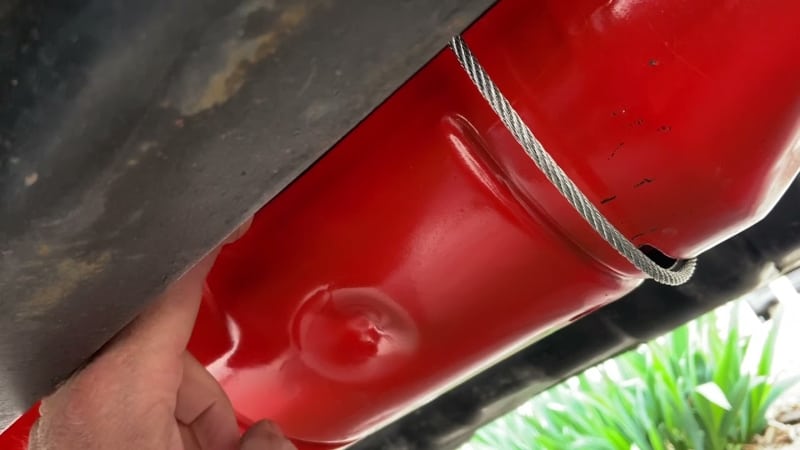
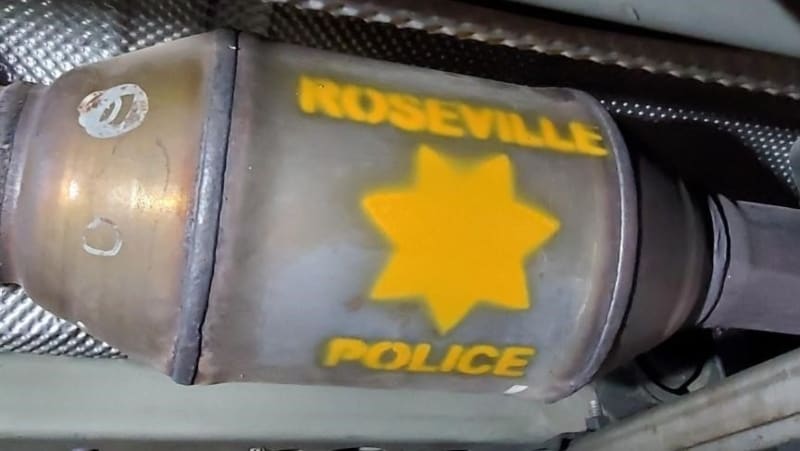
Spray painting an RV catalytic converter helps deter theft. Devices like a Cat Strap physically slow down or even prevent cat converter theft. A simple coat of paint cannot do that.
However, spray painting an RV catalytic converter can act as an effective deterrent. This is because thieves know it will be hard to sell a painted unit. Scrap yards look for painted units and police markings. Scrap buyers will refuse to pay out for potentially stolen devices. In some areas, catalytic converter theft is so rampant that local police departments have even held spray painting events.
4. How Much Platinum Is In An RV Catalytic Converter?
The average catalytic converter contains 3 to 7 grams (0.106-0.247 ounces) of platinum or palladium. RV catalytic converters tend to be larger, and therefore they can contain even more of these precious metals.
The exception is RVs with diesel engines. Since diesel is a cleaner burning fuel than gasoline, the catalytic converters in these RVs contain less precious metal than their gasoline counterparts.
Both platinum and palladium are very valuable, so RV catalytic converters can fetch a hefty price when scrapped. At the time of writing this article, the price of platinum was almost $1,100 per ounce. Like any commodity, this price fluctuates with the market. Even with fluctuating prices, the amount of precious metal alone means an RV catalytic converter is worth a pretty penny.
How Do You Prevent Catalytic Converter Theft On A Motorhome?
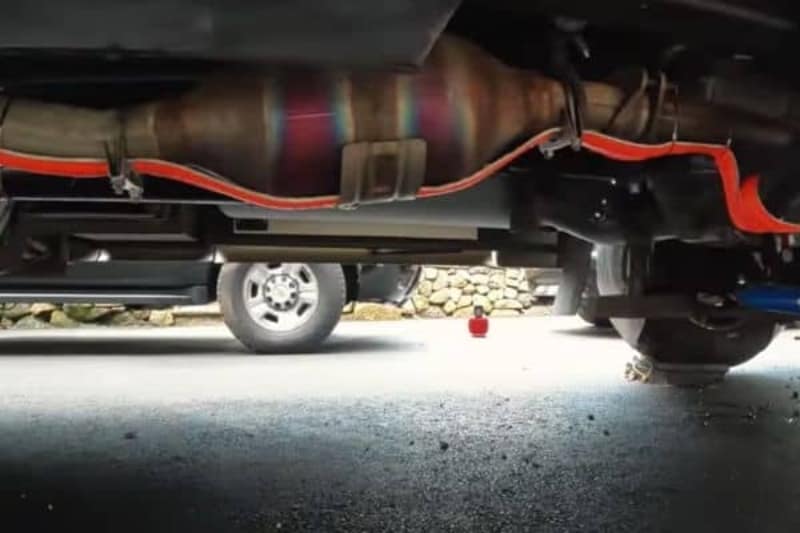
RV catalytic converter theft is on the rise in part because of increasing commodity prices. The relative ease of committing this crime also means that it is becoming a more common problem. RVs are especially susceptible because of their higher-valued catalytic converters and often because of their remote storage locations.
With catalytic converter theft on the rise, it is important to safeguard yourself and your rig. The very expensive cost of repairing a stolen catalytic converter can devastate any RVer’s camping season budget. It is no wonder that devices to ward off thieves are becoming increasingly popular.
Using an RV catalytic converter anti-theft device like the Cat Strap is a great way to protect your rig from this type of problem. It is a brightly colored deterrent and uses steel as a barrier to thwart any thief’s saw. Therefore, it defends your RV on two fronts.
While it is important to be mindful of where you park and store your RV, even well-lit and security camera-equipped locations have fallen victim to catalytic converter thieves. Since there is no surefire way to prevent this type of theft, purchasing some kind of deterrent device like the Cat Strap while remaining vigilant about your surroundings is important.
Related Reading:
1. Can A Class B RV Fit In A Garage?
2. Definitive Guide To An Extended RV Warranty For Motorhomes
3. 21 Tips To Secure An RV During A Hurricane
4. 9 Ways To Protect Your RV From Hail Damage
About the Author:
Laura is a part-time RVer and a full-time mom of three. Long-time campers and RVers before children, Laura, and her husband have fallen even more in love with the RV lifestyle since becoming parents to a child with food allergies.
Having her own kitchen on wheels makes her RV trips amazing. Laura is passionate about finding ways to make traveling with young children fun, easy, and attainable.


